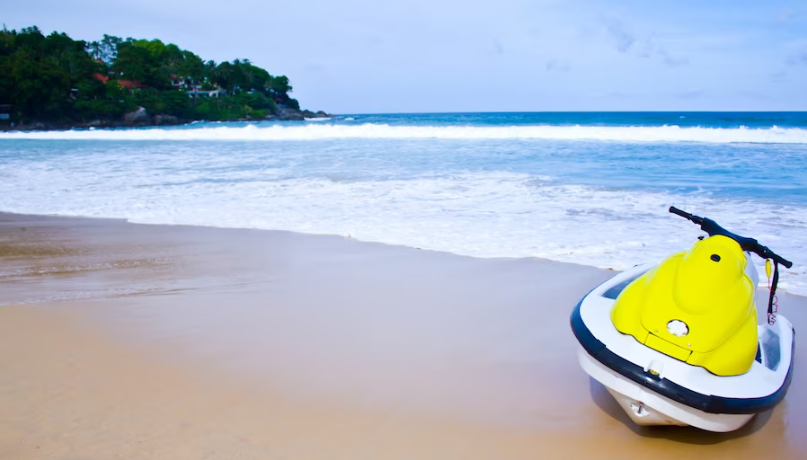A jet ski is a fun and thrilling way to experience the outdoors while being less expensive and simpler to operate than a recreational boat. Personal watercraft are ideal for anyone visiting a beach or living close to a body of water. But many people out there are asking that are Jet Skis dangerous somehow it is dangerous if you will not take precautions so be careful since a jet ski may be as deadly as any automobile and you can face Jet Ski injuries.
Each year, hundreds of water sports-related fatalities and accidents are brought on by jet skis. Some contributing factors are the absence of a boat’s protective shell around the rider, operator inattention or lack of experience, riding at high speeds, a lack of training, and sometimes the Jet Ski crash.
Get caught in a storm.
The weather is among the most terrifying circumstances on the open sea. So it’s wise to check the weather before jet skiing.
It’s also a good idea to keep an eye on the horizon; if you notice any dark, obnoxious clouds, turn around and return to land. The reason is that storms can produce high waves and rough water, making riding challenging and potentially lethal lightning.
Flip or fall off
Most Jet Ski models feature a rear sticker instructing you what to do if they capsize because overturning while operating one is typical. You can prevent a jet ski from flipping by watching for waves, avoiding sudden movements, and limiting speed. If you don’t want to fall off, you should know the terrain and refrain from riding a jet ski at peak speed.
Even though it may be difficult to change the circumstances that lead to an accident, there are steps you can take to lessen the effects of a fall. These include falling correctly, slowing down, wearing protective gear, and avoiding choppy and shallow water.
Break the law
It’s interesting to note that there are the same number of Jet Ski safety regulations for land and water. Following these guidelines is essential to guaranteeing an incident-free, safe, and peaceful Jet Ski trip. Keep in mind that these regulations prioritize your and others’ safety. The fundamental ones include obtaining the required licenses, abstaining from speeding in no-wake zones, abiding by the permitted places and hours to ride, abstaining from driving after drinking, and donning the appropriate safety gear.
Underestimate how long it takes to stop the Jet Ski
Is Jet Ski safe? First of all, be aware that personal watercraft do not instantly stop. Not knowing how long it takes to stop your ski might hurt you and other people and harm the equipment. Therefore, if you’re new to jet skiing, it’s a good idea to practice stopping in a wide-open area where you won’t endanger yourself or others.
Ride too close to or cut off other watercraft.
When operating a jet ski, the possibility of colliding with another watercraft always exists. Similar to traffic regulations, watercraft regulations are subject to your knowledge. The best action is to steer clear of other boats as much as possible and always remember that sailboats have the right of way.
What safety equipment is required on a jet ski
Renting a jet ski will never disappoint if you desire an exciting and fun-filled getaway. Aside from the refreshing sea breeze, you’ll experience while riding a jet ski, you’ll also enjoy getting sunburned and watching the gentle waves splash around you. A Jet Ski experience is enjoyable and exhilarating. Like any water sport, failing to abide by the rules of the rental can put you in danger. You can get the most out of your Jet Ski rental by complying with some safety guidelines.
The following blog provides some Jet Ski safety advice and the low-down on jet skiing etiquette and rules, so you can operate your jet ski properly and stay safe while having fun.
Right of way for jet skis
Boats and other fishing and commercial vessels always have the right-of-way, so when you’re close to one, keep to the right. Additionally, if two boats or jet skis are about to collide, the one on the right has the right of way.
Awareness of other water users
Always keep an eye out for other boats on the lake. Before you turn or cross a wake, it is best to know where other boats are and where they are headed. Unfortunately, jet skiing accidents tend to involve collisions, so be aware of the other vessels around and where they are born.
A wave or wake to jump
Ensure that the craft does not obstruct your visibility to others and your own if your course requires you to cross its wake. Larger boats might not be able to see you or get out of your way in time to avoid a collision.
Operating speed for jet skis
Follow the limits regardless of whether marked, as municipal ordinances or bylaws typically establish speed limits. You must be aware of the posted speed limit; failing to do so could result in a fine or, worse still, an accident. It would be a good idea to reduce your speed appropriately in congested locations, just like you would if you were driving a car.
Wear the proper safety equipment for jet skiing.
Are jet skis dangerous, another safety is to wear an appropriate life jacket and eye protection to prevent water spray from obstructing your vision. A wet suit offers weather protection, while tennis shoes or deck shoes, gloves, and greater machine control are all recommended. You can call for assistance in an emergency by blowing the whistle on your life jacket.
Safety lanyard for jet skiing
Never use your jet ski without the safety lanyard fastened to you; if you fall from the craft, the line will immediately shut the engine. Use this safety feature at all times to help prevent bad mishaps!
The noise of jet skis
Recognize the noise that your art produces. Avoiding operating at high speed close to the shoreline, waterfront properties, and other boats is the best method to prevent noise complaints. Additionally, you should lessen noise in the morning. Additionally, always warm up the Jet Ski engine before riding by starting it in the water.
The environment around your jet ski
Don’t spill fuel, oil, or other pollutants where they don’t belong. It shouldn’t even need to be said. Additionally, avoid operating your jet ski close to aquatic life or vegetation. This will lessen your craft’s impact on the environment and prevent needless harm to the equipment on the ship.
Other water enthusiasts
Boats, fishermen, swimmers, surfers, and water skiers must all share the waterways with jet skiers. You should respect their right to Jet Ski safety, access, and water use and keep your distance from them as instructed or else you will be no longer safe and soon be a part of a Jet Ski injury.

